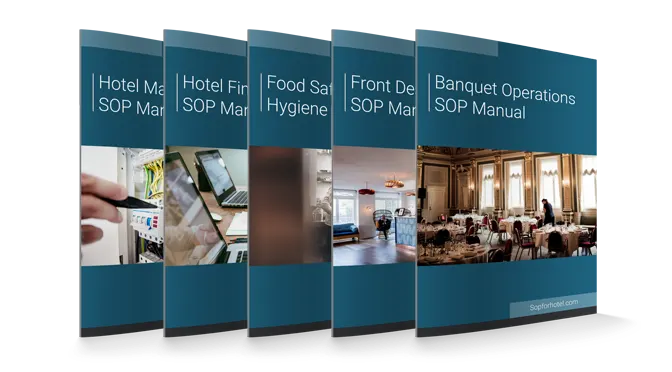Your cart is currently empty!
Efficient Interdepartmental Collaboration in the Hotel Industry

By
|
What are the tangible benefits of interdepartmental collaboration in the hospitality industry and how does it offer a blueprint for other hotels seeking to enhance their guest experience?
Table of Contents
Implementing interdepartmental collaboration within a hotel environment fosters a comprehensive understanding of the responsibilities and roles of team members across various departments. This integrative approach is crucial for executing fast and important cooperative actions or “relay” actions that require seamless coordination among staff. Daily interactions between departments promote cooperation and allow employees to gain insights into the functions and challenges faced by their colleagues. While interdepartmental collaboration can initially appear complex due to the numerous interactions and processes involved, it ultimately provides a clear perspective on the guest’s journey through the hospitality system and highlights the interconnected roles of service providers.
Examples of Daily Interdepartmental Collaboration
Housekeeping and Front Desk Coordination
- Room Readiness: Front desk staff regularly communicate with housekeeping to ensure rooms are cleaned and ready for new guests, especially during peak check-in times. This real-time coordination helps minimize wait times for guests and ensures a smooth check-in experience.
- Special Requests: When a guest makes a special request, such as additional amenities or room preferences, the front desk relays this information to housekeeping to prepare the room accordingly before the guest arrives.
Maintenance and Housekeeping Collaboration
- Room Maintenance: Housekeeping staff often report maintenance issues, such as a leaky faucet or malfunctioning air conditioning, directly to the maintenance department. Prompt attention to these issues ensures that guests experience minimal inconvenience and maintain a high level of satisfaction.
- Preventative Maintenance: Maintenance schedules are often coordinated with housekeeping to perform routine checks and repairs when rooms are vacant, reducing disruptions to guests.
Food and Beverage (F&B) and Sales, Banquet and Housekeeping
- Event Setup: The sales/banquet team works closely with the F&B department to coordinate the setup for conferences, weddings and other functions. This includes arranging catering services, setting up banquet halls and ensuring all guest needs are met seamlessly.
- Room Service: Communication between F&B and housekeeping is crucial for room service operations. For example, housekeeping ensures that room service trays are promptly removed from hallways and rooms, maintaining a tidy and pleasant environment for guests.
Front Office and Security
- Emergency Response: In case of emergencies, such as a fire alarm or a medical situation, front office and security teams collaborate to ensure guest safety. This includes coordinated evacuation procedures and immediate assistance to those in need.
- Lost and Found: Front office and security work together to manage lost and found items. When a guest reports a missing item, security investigates, while front office communicates with the guest and updates them on the status of their lost belongings.
Concierge and Valet Services
- Guest Arrivals: The concierge team coordinates with valet services to ensure that guests’ vehicles are promptly taken care of upon arrival. This includes communicating any special parking needs or preferences of VIP guests.
- Activity Planning: When guests book activities or make dining reservations through the concierge, the team often liaises with valet services to arrange transportation, ensuring a seamless guest experience from start to finish.
IT and Front Desk Operations:
- System Maintenance: The IT department works closely with front desk staff to ensure that all reservation and check-in systems are functioning correctly. This includes routine maintenance, troubleshooting technical issues, and implementing system updates during low-occupancy periods to minimize disruptions.
- Wi-Fi Services: IT and guest services collaborate to address guest inquiries and issues related to internet connectivity, ensuring that guests have a reliable and pleasant stay.
Breaking Down Departmental Silos
One significant advantage of interdepartmental collaboration is its ability to dispel the “that’s not my job” mentality, which can prevail in management systems lacking this approach. Without collaboration, employees may adhere strictly to their job descriptions, leading to subpar service delivery. By contrast, interdepartmental collaboration encourages employees and managers to discuss how restrictive job descriptions might hinder their ability to serve guests effectively. This dialogue helps prioritize service delivery methods and fosters a more cooperative work environment.

Why Interdepartmental Collaboration is Effective
Holistic Understanding of Operations
- Shared Knowledge: When employees understand the responsibilities and challenges faced by their colleagues in different departments, they can see how their work impacts the overall guest experience. This awareness reduces the likelihood of a “that’s not my job” attitude and encourages a more unified approach to service delivery.
Enhanced Problem-Solving
- Collective Brainstorming: Collaborative teams bring together diverse perspectives and expertise, which can lead to more innovative and effective solutions to problems. For example, addressing a guest complaint about room amenities might involve input from housekeeping, maintenance, and front desk staff to develop a comprehensive solution.
Increased Accountability
- Shared Responsibility: When employees from different departments work together on common goals, they share accountability for the outcomes. This collective responsibility ensures that everyone is committed to delivering high-quality service and resolving issues promptly.
Improved Communication
- Open Dialogue: Regular interactions and meetings between departments create channels for open communication. This dialogue helps identify potential service delivery issues early and facilitates quick resolutions, enhancing overall efficiency and guest satisfaction.

How to Implement Interdepartmental Collaboration
Cross-Departmental Teams
- Forming Teams: Establish teams with representatives from various departments to tackle specific issues or projects. For instance, a team might be tasked with improving the check-in process, involving front desk, housekeeping and IT staff.
- Regular Meetings: Schedule regular meetings, for these teams to discuss progress, share insights and brainstorm solutions. This practice ensures continuous collaboration and keeps everyone aligned on goals.
Joint Training Programs
- Shared Learning: Conduct training sessions that include employees from multiple departments. These programs can cover topics such as guest/customer service, problem-solving and communication skills, promoting a unified approach to service delivery.
- Role-Playing: Use role-playing exercises to simulate real-life scenarios where employees must work together to resolve issues. This hands-on experience reinforces the importance of collaboration.
Clear Communication Channels
- Information Sharing: Implement systems for easy information sharing between departments. This might include shared digital platforms, regular newsletters, or bulletin boards where updates and important information can be posted.
- Feedback Loops: Create mechanisms for employees to provide feedback on interdepartmental processes. This feedback can help identify areas for improvement and ensure that collaborative efforts are effective.
Leadership Support
- Managerial Commitment: Ensure that managers and supervisors actively support and participate in interdepartmental collaboration. Their commitment sets the tone for the rest of the staff and reinforces the importance of working together.
- Recognition and Rewards: Acknowledge and reward successful collaborative efforts. Recognizing teams and individuals who exemplify interdepartmental cooperation can motivate others to follow suit.
Flexible Job Descriptions
- Broad Roles: Design job descriptions that allow for flexibility and encourage employees to assist in areas outside their primary responsibilities when needed. This flexibility can help break down silos and promote a more cooperative environment.
Practical Application of Interdepartmental Collaboration
A typical interdepartmental initiative involves assembling representatives from various hotel departments to address specific service issues. For instance, a common guest complaint such as insufficient towels in rooms can be resolved through collaborative efforts. Initially, simply adding more towels might seem like the solution, but this can lead to increased costs and inventory issues.
By forming a team that includes receptionists, housekeepers, bellhops, and waiters, a more sustainable solution can be developed. This team-based approach allows for a thorough analysis of the problem, brainstorming of potential solutions, and a collective decision-making process that respects the roles and insights of all departments.
For example, the team might decide that receptionists should notify housekeeping when more than two guests check into a room, prompting the delivery of additional towels. This solution not only addresses guest dissatisfaction but also empowers frontline employees to contribute to service improvement.

Case Study: Enhancing Guest Experience through Interdepartmental Collaboration
Background
The Grand Harbor Hotel, a luxury hotel situated in a bustling metropolitan area, prides itself on offering exceptional guest experiences. However, the management noticed recurring issues related to guest satisfaction, particularly concerning room readiness and special requests. Despite the hotel’s high standards, the “that’s not my job” mentality occasionally hindered seamless service delivery. To address this, the hotel implemented a structured interdepartmental collaboration program.
Identifying the Problem
The hotel management conducted a comprehensive review of guest feedback and internal processes, identifying two primary issues:
- Delayed Room Readiness: Guests often experienced delays during check-in because rooms were not prepared on time.
- Inconsistent Handling of Special Requests: Guest requests for additional amenities or special arrangements were sometimes overlooked or poorly managed.
Implementing the Solution
The management decided to create a cross-departmental team to address these issues, involving representatives from the front desk, housekeeping, maintenance, and guest services. The team’s objectives were to improve room readiness and streamline the process for handling special requests.
Step 1: Regular Coordination Meetings
- Weekly Meetings: The team held weekly meetings to discuss ongoing issues, share updates, and brainstorm solutions. These meetings facilitated open communication and ensured everyone was aligned on goals.
- Daily Check-ins: Brief daily check-ins were introduced to address immediate concerns and adjust plans as needed.
Step 2: Integrated Communication Systems
- Shared Digital Platform: The hotel implemented a shared digital platform where team members could update the status of room preparations and special requests in real-time. This platform was accessible to all relevant departments.
- Instant Messaging Groups: Departments used instant messaging groups to quickly communicate urgent matters, such as maintenance issues reported by housekeeping that needed immediate attention.
Step 3: Joint Training Programs
- Cross-Training: Employees from different departments participated in cross-training sessions to understand each other’s roles better. Front desk staff learned basic housekeeping protocols, while housekeepers were trained on handling guest inquiries during check-in peaks.
- Role-Playing Exercises: The team engaged in role-playing exercises to simulate scenarios requiring interdepartmental collaboration, such as handling a VIP guest with specific needs.
Step 4: Leadership Support and Recognition
- Managerial Involvement: Department managers actively participated in collaboration efforts, providing guidance and support. Their involvement underscored the importance of the initiative.
- Recognition Programs: The hotel introduced a recognition program to reward teams and individuals who exemplified outstanding collaborative efforts, fostering a culture of cooperation.
Results
Improved Room Readiness
- The coordination between the front desk and housekeeping led to a significant reduction in delays during check-in. Housekeeping staff were notified in real-time about early check-ins and VIP arrivals, allowing them to prioritize room preparations accordingly.
Streamlined Special Requests Handling
- The integrated communication system ensured that special requests were promptly relayed to the appropriate departments. For example, a request for additional pillows or a baby crib was immediately logged into the shared platform, and housekeeping responded without delay.
- The cross-training initiatives empowered staff to handle guest requests more effectively, even if they fell outside their usual responsibilities.
Enhanced Guest Satisfaction
- Guest feedback showed a marked improvement in satisfaction scores, particularly regarding check-in efficiency and the handling of special requests.
- The hotel received numerous positive reviews highlighting the attentive and seamless service, which boosted the hotel’s reputation and occupancy rates.
Conclusion
The Grand Harbor Hotel’s interdepartmental collaboration program successfully addressed key service delivery issues, enhancing overall guest satisfaction. By fostering a cooperative environment, improving communication, and supporting cross-training initiatives, the hotel created a more responsive and efficient service model. This case study demonstrates the tangible benefits of interdepartmental collaboration in the hospitality industry, offering a blueprint for other hotels seeking to enhance their guest experience.
For more information on Interdepartmental collaboration in the hospitality industry, we recommend the following resources:
_________________________________________________
Absolutdata – 5 Steps to Improve Collaboration in the Hospitality Industry
: https://absolutdata.infogain.com/blog/5-steps-to-improve-collaboration-in-hospitality-industry/
From Insight
to Implementation
Equip your team with proven operational procedures to adapt to industry challenges, optimize performance, and ensure consistent excellence.
MORE articles
Solutions for Your Operations
-
Organize your Hotel Pre-Opening steps and teams
Hotel Pre-Opening – Critical Path / Checklist


